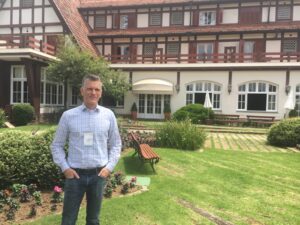This week Alexander Zipf was giving an invited keynote presentation at the 18th Geoinfo Conference in Campos do Jordão, São Paulo, Brazil.
The GEOINFO conferences aim to bring together leading GIScience and spatial database researchers, to present to the local community a perspective of the state-of-the-art in the area. Past speakers have included Max Egenhofer, Gary Hunter, Andrew Frank, Roger Bivand, Mike Worboys, Werner Kuhn, Stefano Spaccapietra, Ralf Guting, Shashi Shekhar, Christopher Jones, Martin Kulldorff, Andrea Rodriguez, Max Craglia, Stephen Winter, Edzer Pebesma, Fosca Giannotti, Christian Freksa, Thomas Bittner, Markus Schneider, Helen Couclelis, Randolph W. Franklin, Paul Brown and Michael Batty.
The title of the talk by Alexander Zipf was:
Analysing and Improving Volunteered Geographic Information for Humanitarian Activities
Up-to-date and comprehensive geographical information is essential for the planning and implementation of humanitarian aid in the context of crises and disasters. In addition to the established data sources of professional organisations – such as remote sensing, government and commercial data – alternative options have gained importance in recent years. These new options include different types of information that are contributed by volunteers e.g. geographical information based on disaster mapping activities on platforms such as OpenStreetMap, but also spatial information extracted from various social media platforms like Twitter or Flickr. The automated evaluation of these data from social media currently presents an interesting challenge. Other important questions are: How can we analyse, evaluate and improve the quality of these new data? And how can we use them effectively in the context of disaster management? The presentation will discuss a number of methods that we have devised to help us find answers, in particular with respect to OSM quality assessment and improvement, the development of new microtasking apps such as MapSwipe and also the spatiotemporal analysis of social media data.



